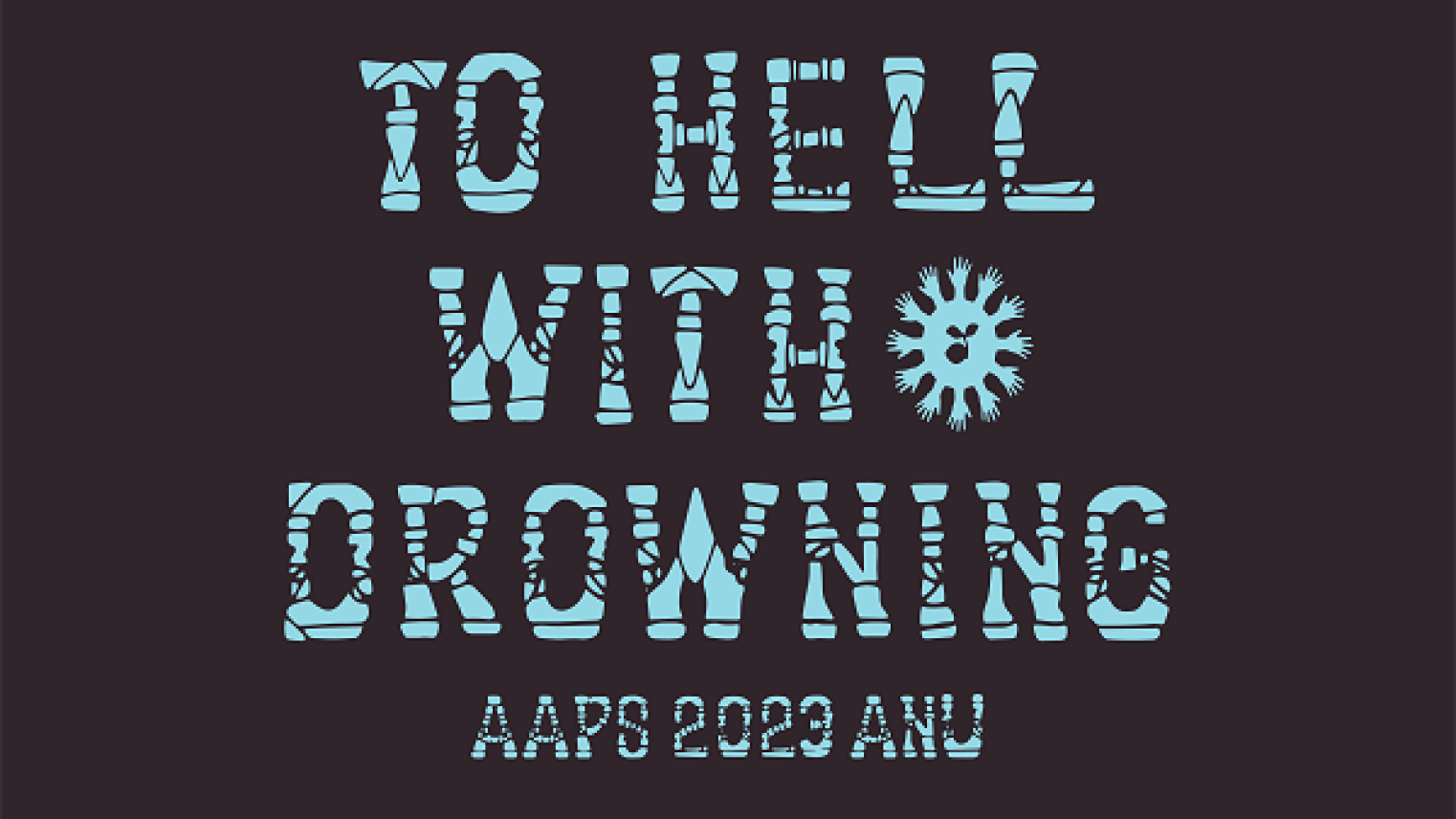CONFERENCE CONVENORS & SPONSORS
This conference is organised and convened by
The conference is supported by:
- the Australian Association for Pacific Studies
- the ANU Pacific Institute
- the ANU School of Culture, History & Language
- the ANU College of Asia and the Pacific (CAP)
- the ANU College of Law
- the CAP Asia Pacific Innovation Program
- and the ANU Gender Institute
“We need stories. And not just stories about the stakes, which we know are high, but stories about the places we call home. Stories about our own small corners of the Earth as we know them. As we love them.” – Julian Aguon, To Hell With Drowning, 2021
The 2023 AAPS conference theme emphasises the need to resist and reframe fatalist and narrow representations of Oceania.
From the highlands to the islands, the conference aims to advance multiscopic understandings of Oceanic people’s relationships and relationality of places through storytelling rooted in a trans-disciplinary, critical and creative Pacific Studies.
Endorsing Indigenous human rights lawyer and writer Julian Aguon’s call for “stories about the places we call home”, we seek stories and conversations that illuminate fierce attachments to place and the immense beauty, magic and abundance of Oceania.
The Pacific Studies community recognises both ancestral and contemporary kinships between Aboriginal and Torres Strait Islander peoples, South Sea Islanders, Māori and Pacific Islanders.
The 2023 conference will take place at the Australian National University, an institution that is located on the unceded lands of the Ngunnawal and Ngambri people and central to the Australian coloniality that continues to impinge upon the sovereignties of First Nations of this Country and beyond in Oceania. It is also an institution central to the decolonial possibilities envisaged by Pacific Studies.
This conference understands this place as a site for meaningful solidarities and approaches to Pacific Studies that are both place-based and multi-sited in scope.
Ticket information:
- Early Bird tickets and prices for participation (for the full four days of the conference) are currently available until 11.55 pm on Friday 17 February 2023.
- From Saturday 18 February 2023, Standard Registration tickets and prices for participation (for the full four days of the conference) will apply.
- If you want to be eligible for members' prices, please be sure to join AAPS via our website.
- Registration includes an evening reception on Tuesday evening and morning tea, lunch and afternoon tea from Wednesday-Friday.
- Aside from this, don't forget to make sure you get a ticket to the conference dinner as well in your purchase!
- In the checkout questions, you will be able to list your dietary requirements, access needs and if you are a postgraduate/ECR if you would like to participate in the Tarcisius Kabutaulaka's masterclass on the afternoon of Tuesday,11 April 2023.
- If you would like to participate in only one day of the conference, you can purchase one of the 'Daily flat rate' ticket.
Please note that this conference is an in-person event. However, the Epeli Hau’ofa public lecture will be recorded and uploaded at a later date.
Postgraduate/ECR workshop:
The postgraduate/ECR workshop will take place on Tuesday afternoon, 11 April 2023. We encourage postgraduates and ECRs to join us in the afternoon from 12pm for the workshop with lunch provided. Registrations are limited to 30 places and are essential.
Program:
Tues 11 April - The Welcome to Country and the Epeli Hau’ofa public lecture - late afternoon. This will be followed by an evening reception for all registered participants of the conference.
Wednesday 12 April - Friday 14 April 2023 will consist of a series of keynote plenaries, as well as, three parallel streams of sessions across multiple sites on The Australian National University campus including the HC Coombs Building, the Hedley Bull Building, the Menzies Library, the Coombs Extension and other locations.
Speakers, sessions and convenors
Announced speakers:
- Maureen Penjueli - Pacific Network on Globalisation, Keynote panellist
- Yuki Kihara - Artist, Keynote panellist
- Ronny Kareni - United Liberation Movement for West Papua – Pacific Representative, Keynote panellist
- Professor Alice Te Punga Somerville - University of British Columbia, Keynote panellist
- Kim Kruger - Moondani Balluk Academic Centre at Victoria University, Keynote panellist
- Professor Emeritus Terence Wesley-Smith - Center for Pacific Islands Studies at the University of Hawai’i at Manoa, Keynote panellist
- Joy Lehuanani Enomoto - Koa Futures/Hawai’i Peace and Justice, Keynote panellist
- Aunty Sana Balai - Living Museum of Logan, Keynote panellist
- Dr Melinda Mann - CQUniversity, Keynote panellist
- Lisa Hilli - School of Culture, History and Language, ANU, Keynote panellist
- Professor Katerina Teaiwa - School of Culture, History and Language, ANU, Keynote panellist
Sessions and convenors:
- Pacific Studies Fight Club?: ethics, politics and possibilities of critique, Professor Alice Te Punga Somerville
- But whose lands are you on? Positioning Pacific diasporas on Aboriginal lands, Dr Melinda Mann and Kim Kruger
- Stories of Environment and Disability in Oceania, Dr Bonnie Etherington
- Navigating the Archives, Kathryn Dan
- West Papua: Our Pacific Struggle, Joey Tau
- Articulating Em(OCEAN): Survivance on a Sea of Islands, a Youngsolwara Tale of Beautiful Chaos, Jason Wesley Ravai Titifanue
- ‘Oceanic Diplomacy’: Indigenous Diplomatic Pathways in the Contemporary Pacific, Honorary Associate Professor Greg Fry and Salā Dr George Carter
- Rethinking Australian Coloniality through Pacific Biography, Professor Katerina Teaiwa, Dr Nicholas Hoare and Talei Luscia Mangioni
- Ongo, lau tohi, pese (listen, read, sing): create!, Associate Professor Mandy Treagus and Rita Seumanutafa
- Constructing belonging: Situating Indo-Fijian gendered narratives in Oceania, Domenica Gisella Calabrò and Romitesh Kant
- Vā Hine: Embodied Relationality, Dr Tia Reihana and Dr Nālani Wilson-Hokowhitu
- Embodying Vā: An activation through research, artistic expression and movement, Jasmin ‘Ofamo’oni
- Suiga: A decolonial choreographic exploration of Christianity within the Pacific, Chas Mamea
- Justice for Creation: Indigenous perspectives and the role of the church, Talitha Fraser and Raisera McCulloch
- Navigating unchartered waters: critical approaches to law and Pacific Peoples, Associate Professor Rebecca Monson
- Reframing and transforming oceans governance in Oceania, Pip Louey
- To hell with the status quo! Translating equitable principles into meaningful actions in Pacific Fisheries, Dr Bianca Haas
- Just Restore: what do Oceania communities tell us about ways to do Justice in Australia, Sarouche Razi
- Environment Law in Practice: Perspectives from working in the Pacific, Dr Bal Kama
- The Flying Canoe, Marita Davies
- Mapping Otherwise Realms, Dr Emma Powell, Dr Jess Pasisi and Melanie Puka Bean
- Refusing Fatalism: Voices for climate justice and decolonial futures, Emerita Professor Margaret Jolly, Dr Siobhan McDonnell and Vehia Wheeler
- Decolonial Feminisms in Oceania: Localised and Regional Perspectives, Dr Cammi Webb-Gannon, Dr Jenny Munro and Elvira Rumbaku
Session types
These will be one of three types of sessions – presenting, creating and relating.
Presenting
Presenting sessions, or a session with prepared papers, may follow a more conventional format with a chair, a panel of presentations, and papers shared with the audience. We recommend keeping presentations brief (15 minutes maximum) and highly focused on stimulating discussion between panellists and the audience. We also encourage the possibility of multi-session seminars or ‘streams’, to promote deeper discussion of relevant themes.
Relating
Relating sessions, or a session without papers can be based on Pacific modes of oral practice, including tok stori, talanoa and yarning circles. These include a dialogue or roundtable format or a workshop format in which presenters create interactive spaces between presenters and audiences. We encourage these sessions to intentionally engage trans-disciplinary Pacific studies, which incorporate participants who are community members, students, activists, practitioners and public officials, to move knowledge production beyond the academy.
Creating
Creating sessions are experimental sessions, including formats such as workshops, question-driven sessions, performances (weaving, dancing, spoken word, creative writing, etc.), film screenings, community engaged actions (zine-making, postering, etc.), reading groups with discussion of pre-circulated materials, resource and skills sharing sessions, and beyond.
Event Speakers

Various Distinguished Guests and Speakers
Various Distinguished Guests and Speakers
See the conference website for the program and other details.
